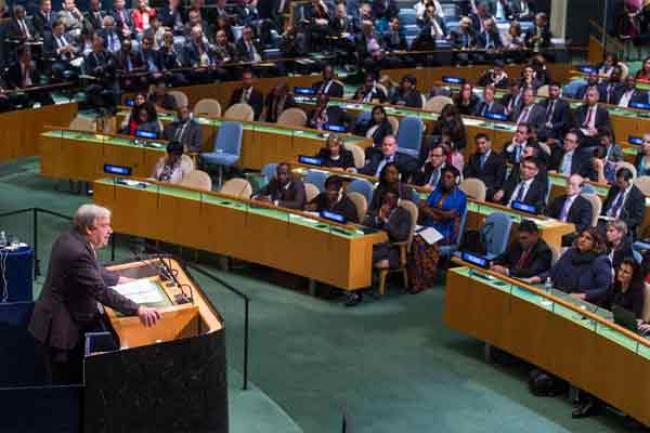Just Earth News 18 Oct 2016

Amanda Voisard
Guterres, aged 67, was Prime Minister of Portugal from 1995 to 2002, and the UN High Commissioner for Refugees from June 2005 to December 2015. He will become the world's top diplomat on 1 January 2017, and hold that post for the next five years.
Adopting a consensus resolution put forward by its President, Peter Thomson, the Assembly acted on the recommendation on the UN Security Council, which on 6 October forwarded Guterres' name to the 193-member body as its nominee for UN Secretary-General for a five-year period, ending 31 December 2021.
Ten years to the day after his own appointment as Secretary-General, Ban said: “Secretary-General-elect Guterres is well known to all of us in the hall. But he is perhaps best known where it counts most: on the frontlines of armed conflict and humanitarian suffering,” referring to his time as head of the UN refugee agency.
Noting that he has long valued his advice, and long admired his spirit of service, Ban declared: “He is a wonderful choice to steer this Organization as we build on the progress of the past decade, while addressing the insecurity and uncertainties of on Thursday's world.”
The Assembly's resolution also welcomed the historic process Member States set in motion late last year: the selection of a new United Nations Secretary-General, traditionally decided behind closed-doors by a few powerful countries, has for the first time in history, involved public discussions with each candidate campaigning for the world's top diplomatic post.
These so-called 'informal briefings' between the candidates, UN Member States and civil society representatives kicked off on 12 April, when the first three candidates presented their 'vision statements' and answered questions on how they would promote sustainable development, improve efforts to create peace, protect human rights, and deal with huge humanitarian catastrophes should they be selected to lead the Organization.
In addition, this past July, the UN held its first-ever globally televised and webcast townhall-style debate in the General Assembly Hall, where the confirmed candidates at the time took questions from diplomats and the public at large.